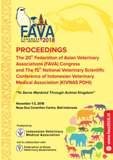SA-18 Retrospective Study of Feline Panleukopenia Virus in Jakarta
Abstract
Feline Panleukopenia Virus (FPV) is caused by feline parvovirus, a single stranded DNA virus. This virus is a fatal and highly contagious in cats. Control of this disease is complicated by environmental resistance, the shedding of high viral loads and interspecies transmission. Cats all of ages may be affected by FPV but kittens are most susceptible. Signs of disease include diarrhea, lymphopenia, neutropenia, followed by thrombocytopenia and anemia, cerebellar ataxia (in kittens only), abortion and immunosuppression (transient in adult cats) (Truyen et. al 2009). The severity of clinical sign depends on the immune status of the animal and the present of other infections (Rodriguez and Guererro 2017).
In Jakarta, the prevalence rate of this viral infection believed still high, but there were only few studies has been reported. The aim of this study were to provide the retrospective data of prevalence rate and survival rate concerning ages and concurrent disease of cats infected by FPV in Veterinary Clinic Drh. Cucu K. Sajuthi and Assosiate, Jakarta, Indonesia.

